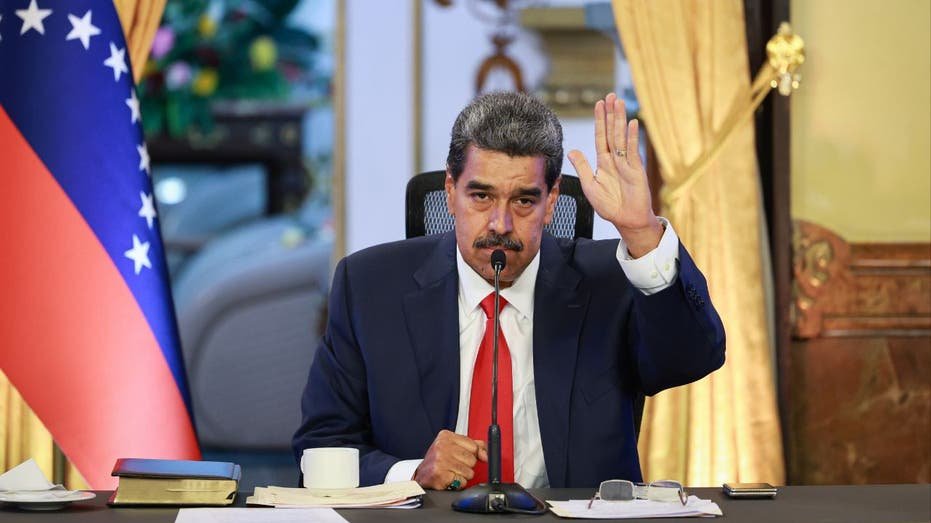Earlier this year, the Biden administration eased sanctions on Venezuela in efforts to persuade dictator Nicolas Maduro to hold free and fair elections. It didn’t work.
Now, Latin America watchers say, it’s time to bring back those sanctions in full force – by canceling the licenses for U.S.-based oil and gas companies to do business there.
The U.S. reinstated sanctions on the gold mining industry that were lifted earlier this year under the Barbados Agreement in April, as Maduro continued to crack down on the opposition, including by barring opposition primary winner Maria Corina Machado from running.
It allowed the expiration of some sanctions relief and export licenses, but critics say the administration left major carve-outs for U.S.-based companies doing business there.
VENEZUELA SAYS FOURTH US CITIZEN ARRESTED IN PLOT TO KILL PRESIDENT MADURO
In July, Venezuela’s National Electoral Commission claimed that Maduro won 51.2% of the vote, defeating the Unity Platform candidate Edmundo González, backed by Machado. But precinct-level vote counts published by the opposition show González winning by a large margin. The U.S. government recognized González as the winner on August 1, yet Maduro still clings to power.
In September, U.S. officials unveiled new personal sanctions against Maduro and his acolytes over human rights abuses. “The individual sanctions are meaningless and obviously haven’t changed [Maduro’s] behavior one bit,” Victoria Coates, former deputy national security advisor and senior advisor at the Department of Energy under Trump, told Fox News Digital.
Maduro officials have enforced the election results they claim through harsh post-election repression of protesters, including charging González with terrorism before he sought refuge in the Spanish embassy. González said last week he was “forced” to accept the Maduro win before being allowed to seek asylum in Spain.
“They’ve done nothing serious to try to challenge the results of the fraudulent election, to support the folks who are trying to get the information out, and then to offer an off-ramp to Maduro.”
BIDEN ADMINISTRATION IMPOSES SANCTIONS AGAINST VENEZUELAN PRESIDENT MADURO’S ‘CRONIES’
“Get him out of the country, figure out what his terms are,” Coates went on. “By the way, there are a bunch of the senior military brass in Venezuela who like to spend a lot of time in Miami. Is that something you want to hold at risk?”
“They could see if they could have some conversations with them about what a transition would look like. But rather than doing any of that, they’re just letting the oil flow.”
“The administration is, on the one hand, doing some actions that would make it appear that it is heightening enforcement against the Maduro regime,” Andres Martinez-Fernandez, lead Latin America policy adviser at Heritage’s Allison Center for National Security, told Fox News Digital.
“But it’s clearly holding off on really restating and fully pressuring the Venezuelan government with sanctions and economic restrictions, particularly when it comes to the oil sector.”
One option would be to cancel the remaining licenses for big oil companies like Chevron to make deals with PDVSA, the country’s state-owned oil company. Chevron scored a license to do business with the oil-rich state in 2022 after Maduro had expressed an openness to conducting fair elections. The White House left open the possibility for other companies to apply for such licenses to take advantage of the nation’s oil-rich reserves.
“The oil licenses, which only benefit Maduro and his cronies, should have been canceled as soon as they refused to recognize the real results of the election showing his loss by two million votes,” Rep. Maria Salazar, R-Fla., chair of the House Foreign Affairs Western Hemisphere Subcommittee, told Fox News Digital.
“The failure to make these decisions is sending a clear signal around the world that United States leadership is weak, and you can get away with whatever you want.”
“We want them canceled … this is a lifeline to the regime,” opposition adviser Rafael de la Cruz said in reference to the licenses during a panel discussion hosted by the New York-based Council of the Americas business organization earlier this month.
He said the presence of U.S. oil companies serves to “normalize … de facto dictatorship that he is trying to set up in Venezuela.”
The National Security Council has said its sanctions are designed to ”hold Nicolas Maduro and his representatives accountable for its electoral fraud and violent repression, without harming the everyday Venezuelan people.”
But critics say that oil money rarely flows down to everyday Venezuelans, nearly 80 percent of whom fall below the poverty line.
“The primary sanction facing the Venezuelan people is the regime itself,” Andres Martinez-Fernandez said.
“The Venezuelan regime uses its revenue primarily not to support the Venezuelan people, but to ensure its own grasp on power, whether that’s through buying loyalty in the military or sowing discord abroad” he went on.
“[The sanctions] never should have been lifted, they got scammed,” Senator Marco Rubio, R-Fla., told Fox News Digital.
Why, exactly, the Biden administration hasn’t taken enforcement action is up for debate.
Coates believes it is “to keep domestic energy prices low before the election.”
Martinez-Fernandez said there could be heavy lobbying involved behind the scenes, and the administration could be worried that removing U.S. companies from the scene would create a space for China to swoop in and set up operations.
“The administration is still hoping beyond reason that there is a path to a sort of negotiated settlement with the regime,” he said. “This is what the administration did earlier in the year and late last year with the removal of sanctions, and then dangling the threats of reinstating them. And clearly, that had none of the desired effects.”
Chevron spokesman Bill Turenne said in a statement: “We remain committed to conducting our business in compliance with applicable laws and regulations, both in the U.S. and the countries where we operate.”
